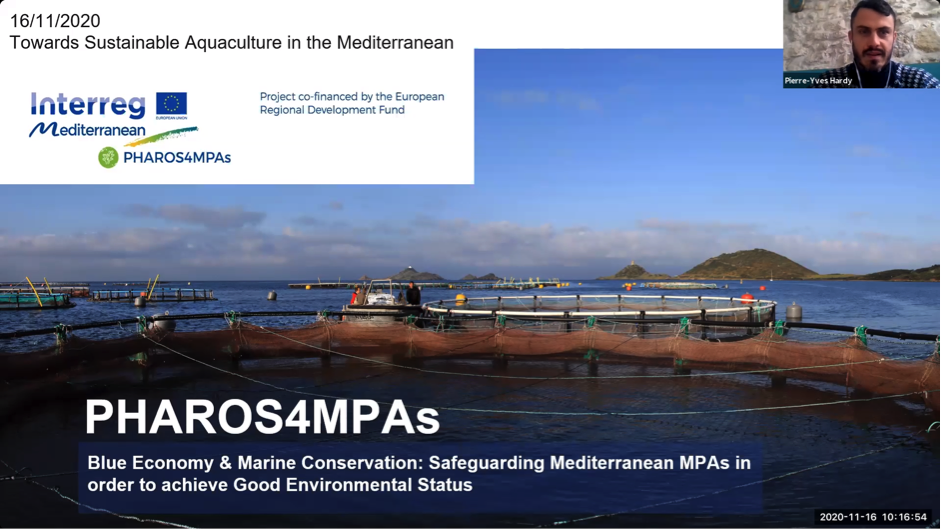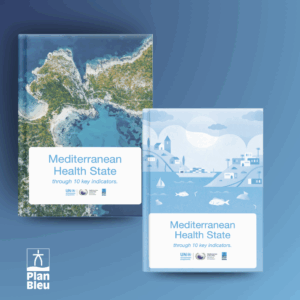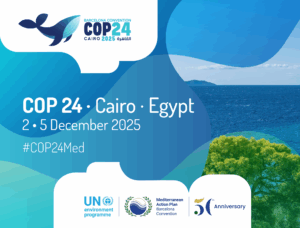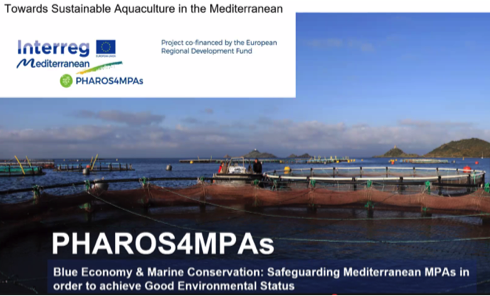
On 16 November 2020, Plan Bleu hosted its second webinar focusing on sustainable aquaculture. This webinar was co-organised by two Horizontal projects of the Interreg Med Programme: the Blue Growth Community and the Mediterranean Biodiversity Protection Community (MBPC).
This series of webinars aims at identifying and exploring innovative solutions to address the main sustainability challenges of the Mediterranean aquaculture sector, and how such solutions could be replicated in other territories, programmes and projects. Key stakeholders that participated included FAO/GFCM, the WestMED Initiative, WWF, IUCN Med. They aim at producing a roadmap for a sustainable transition in Mediterranean aquaculture based on innovative approaches, methods, tools and practices.
Plan Bleu is a member of the MBPC and leads it work package on capitalisation. During the webinar, the PHAROS4MPA project had the opportunity to present and capitalize on its recommendations for aquaculture.
During the webinar, Pierre-Yves Hardy, Project Manager at WWF France, presented and capitalised on the results and recommendations of the PHAROS4MPAmodular project concerning aquaculture (Interreg MED Biodiversity Protection Community). Marine Protected Areas (MPAs) currently cover around 10% of Mediterranean waters, which is projected to increase to 30% in the future. However, most of these MPAs are multi-use and poorly protected, and their biodiversity is most often detrimentally affected by the impacts of aquaculture. Different types of production generate different levels of pressure on biodiversity in MPAs. While the ecological impacts of shellfish farming are relatively limited, fish farming can have more serious impacts, notably due to the introduction and escape of non-indigenous species, excessive intake of nutrients in the food web and effluent discharge.
To better understand how aquaculture can function more sustainably within MPAs, PHAROS4MPA conducted an extensive literature review of the topic and engaged in dialogue with the aquaculture industry, MPA authorities and scientists, in collaboration with partners located in 7 Mediterranean countries.
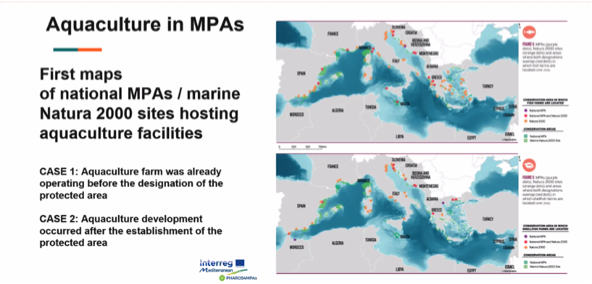 The main recommendations of PHAROS4MPA are that only aquaculture farms with no negative effects on designated protected areas should be allowed within MPAs, and that this should be decided on a case-by-case basis. Indeed, fish farms with sea net pen settlements in areas that count significant grass meadows and coralligenous formations and/or important fish habitats, spawning grounds and nursery areas should not be allowed. More generally, habitats that are sensitive to the discharge of organic matter should not be considered appropriate for fish or shellfish aquaculture, nor should they be used for industrial intensive fish production or the farming of exotic species. Indeed, all of these impacts should be actively mitigated in a context-specific manner and further backed by a solid understanding of each site’s carrying capacity. To this end, authorities and operators need to collaborate more closely and have improved access to spatial and scientific data.
The main recommendations of PHAROS4MPA are that only aquaculture farms with no negative effects on designated protected areas should be allowed within MPAs, and that this should be decided on a case-by-case basis. Indeed, fish farms with sea net pen settlements in areas that count significant grass meadows and coralligenous formations and/or important fish habitats, spawning grounds and nursery areas should not be allowed. More generally, habitats that are sensitive to the discharge of organic matter should not be considered appropriate for fish or shellfish aquaculture, nor should they be used for industrial intensive fish production or the farming of exotic species. Indeed, all of these impacts should be actively mitigated in a context-specific manner and further backed by a solid understanding of each site’s carrying capacity. To this end, authorities and operators need to collaborate more closely and have improved access to spatial and scientific data.
To find out more, you can read the PHAROS4MPA “Safeguarding Marine Protected Areas in the growing Mediterranean Blue Economy: Recommendations for Aquaculture” report here, and learn more about the PHAROS4MPA project here. Finally, you can find more information on Plan Bleu’s webinars on sustainable aquaculture here.
For more information on Plan Bleu’s activities concerning sustainable aquaculture, please contact [email protected].
